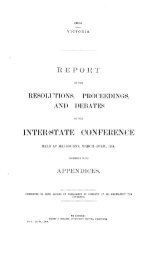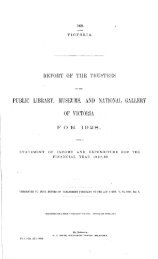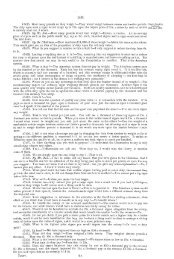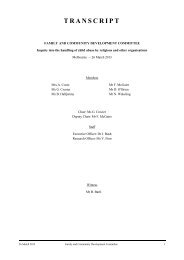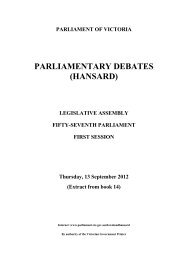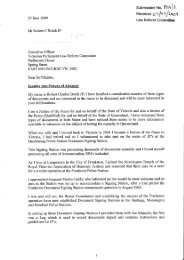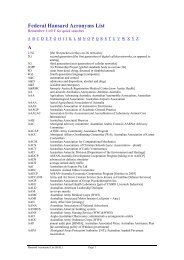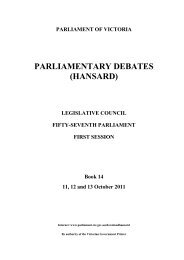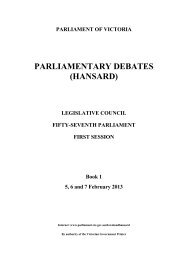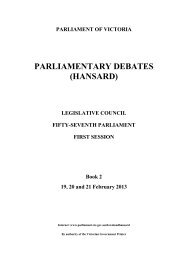Book 8 - Parliament of Victoria
Book 8 - Parliament of Victoria
Book 8 - Parliament of Victoria
Create successful ePaper yourself
Turn your PDF publications into a flip-book with our unique Google optimized e-Paper software.
APPROPRIATION (2011/2012) BILL 2011<br />
1724 COUNCIL Thursday, 2 June 2011<br />
This has led to an underlying imbalance and seen <strong>Victoria</strong>’s<br />
infrastructure program increasingly funded from debt — a<br />
trend which cannot be allowed to continue indefinitely.<br />
In effect, as the economy rebounded from the global financial<br />
crisis, <strong>Victoria</strong>’s financial position remained vulnerable to<br />
unexpected shocks.<br />
Those shocks have now materialised.<br />
Our GST revenues have been reduced by $4.1 billion over<br />
five years as a result <strong>of</strong> the Commonwealth Grants<br />
Commission’s assessment to cut <strong>Victoria</strong>’s share <strong>of</strong> the GST,<br />
and a slowing national economy.<br />
There have also been significant delays in commonwealth<br />
infrastructure funding <strong>of</strong> $550 million.<br />
The recent floods across <strong>Victoria</strong> have required substantial<br />
additional expenditure on repair and rebuilding.<br />
In addition, major projects inherited by this government —<br />
including myki, the regional rail link and HealthSMART —<br />
face significant cost overruns which total around $2 billion<br />
and have further contributed to the run-up <strong>of</strong> debt.<br />
These are significant challenges. They have already affected<br />
the state’s financial position and have made framing the<br />
2011–12 budget much more challenging. They need to be<br />
addressed.<br />
To do this requires steady effort over time — working every<br />
day to build a stronger budget position, one which is capable<br />
<strong>of</strong> funding necessary services and investing in new<br />
infrastructure without relying on excessive debt.<br />
The 2011–12 budget takes important steps in this task:<br />
delivering on the government’s commitment <strong>of</strong> a<br />
$100 million minimum surplus each year, with average<br />
surpluses <strong>of</strong> $164 million over the forward estimates;<br />
achieving an additional $600 million in efficiency<br />
savings from government departments, bringing the total<br />
value <strong>of</strong> savings delivered in this budget to $2.2 billion<br />
over five years;<br />
increasing the rigour and oversight <strong>of</strong> major capital<br />
projects, with a mandatory process <strong>of</strong> scrutiny by the<br />
Department <strong>of</strong> Treasury and Finance and the Treasurer;<br />
lowering forecast expenditure growth with spending<br />
over the forward estimates period now expected to grow<br />
by an average 3.2 per cent a year, compared with 8 per<br />
cent a year over the past decade; and<br />
reaffirming the importance <strong>of</strong> the government’s public<br />
sector wages policy, stating that wage rises should be<br />
2.5 per cent unless accompanied by productivity gains.<br />
As a result <strong>of</strong> our fiscal strategy, net debt will stabilise at<br />
5.9 per cent <strong>of</strong> gross state product.<br />
In all, debt will be $7.5 billion higher than previously forecast<br />
in the 2010–11 budget update. This debt increase can be<br />
attributed substantially to specific causes:<br />
the reduction in GST revenue;<br />
future infrastructure spending and cost blow-outs on<br />
existing projects; and<br />
higher interest costs.<br />
This debt increase represents the combined effect <strong>of</strong> external<br />
shocks and pre-existing vulnerabilities. It illustrates clearly<br />
what the Independent Review <strong>of</strong> State Finances has said —<br />
that <strong>Victoria</strong> would be poorly placed to deal with another<br />
substantial external shock.<br />
That is why the government must continue to work hard to<br />
rebuild our state’s finances in coming years.<br />
A crucial element <strong>of</strong> its fiscal strategy has to be the ongoing<br />
reform <strong>of</strong> the <strong>Victoria</strong>n economy.<br />
<strong>Victoria</strong> has great economic strengths — a diverse economic<br />
base and a skilled workforce.<br />
During the past decade, the budget was underpinned by<br />
strong windfall revenues from the property boom. This is<br />
unlikely to be repeated in the medium term.<br />
Today, the resource-rich states have significant royalty<br />
revenue flowing into their c<strong>of</strong>fers. <strong>Victoria</strong> does not.<br />
The current commodities boom brings considerable benefits<br />
to <strong>Victoria</strong>ns, but poses challenges as well. The Australian<br />
dollar is now poised around $1.08 US, compared with a<br />
post-float average <strong>of</strong> 74 cents — a difference <strong>of</strong> nearly 50 per<br />
cent.<br />
That places a significant burden on many <strong>of</strong> our traditional<br />
export industries, like manufacturing, tourism and education.<br />
The government and the <strong>Victoria</strong>n community must manage<br />
those challenges and foster growth from our traditional and<br />
emerging industries.<br />
The key to this is productivity. It is totally unrealistic to rely<br />
on population growth to underpin economic growth.<br />
Productivity growth is the main driver <strong>of</strong> higher living<br />
standards and economic prosperity, but in the past decade it<br />
has fallen.<br />
In the five years to 1999–2000, productivity growth averaged<br />
2.8 per cent a year. In the five years to<br />
2009–10 it grew by an average <strong>of</strong> just 0.7 per cent a year.<br />
In the 1990s, <strong>Victoria</strong>’s productivity growth exceeded the<br />
national average. Since 2000, it has fallen below the national<br />
average.<br />
Reversing this trend requires a firm productivity reform<br />
agenda.<br />
The government has already announced its plan to cut the<br />
cost <strong>of</strong> regulation on <strong>Victoria</strong>n businesses by 25 per cent over<br />
three years.<br />
Two important independent inquiries will be undertaken by<br />
the <strong>Victoria</strong>n Competition and Efficiency Commission —<br />
one into manufacturing and the other into a state-based<br />
reform agenda, including a comprehensive benchmarking<br />
project to identify where <strong>Victoria</strong> could become more<br />
competitive relative to other states.<br />
Further work will be required.



